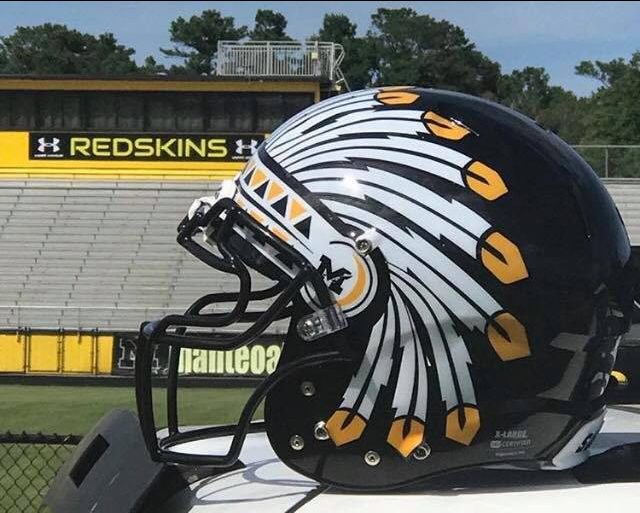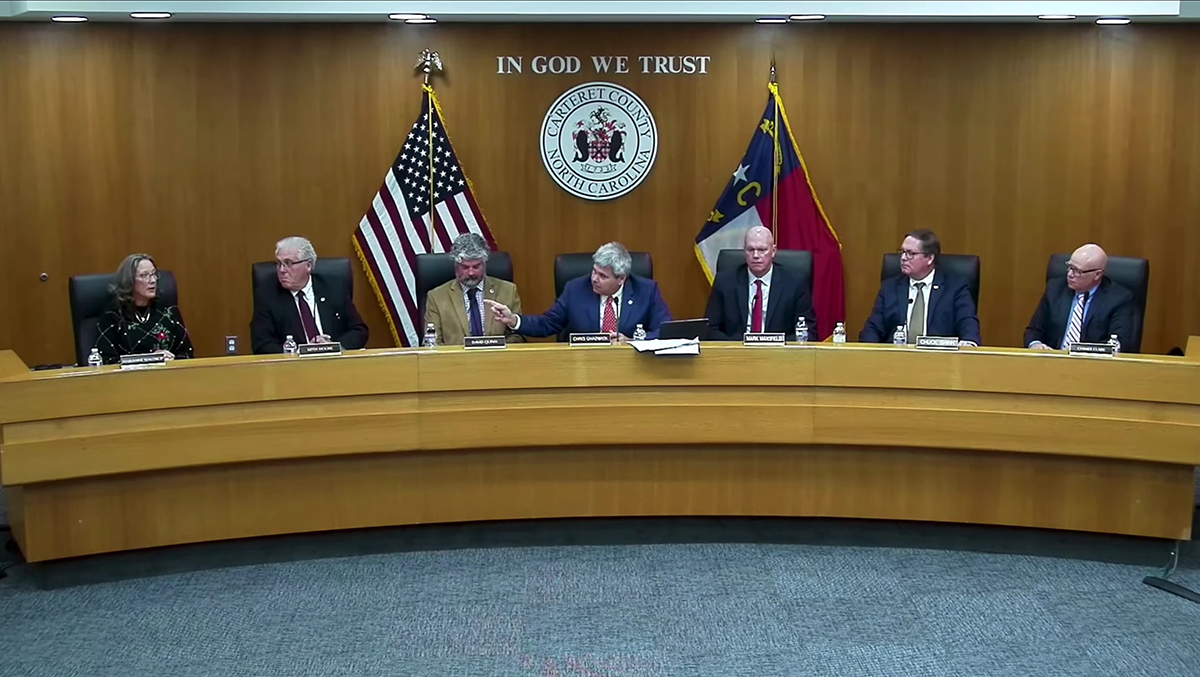
Copublished with Outer Banks Voice
This story has been updated.
Supporter Spotlight
MANTEO — When the Clyde A. Erwin High School in Buncombe County was under national media klieg lights more than 20 years ago over a U.S. Justice Department civil rights investigation of its Native American mascots, the Manteo Redskins and Braves sports teams in Dare County remained distant from growing national controversy over names Native Americans viewed as insulting and disrespectful.
Eventually, the Asheville school changed its offensive Squaw mascot to Lady Warriors. In response to the 2002 State Board of Education directive that required North Carolina school districts to review any use of American Indian mascot names, Manteo scaled back Indian imagery in its mascots, while keeping the Redskins and Braves team names.
But now former and current students and community members say it’s past time for the names to go.
Inspired by the Black Lives Matter movement, some alumni of Manteo schools in August submitted a petition with more than 12,000 signatures to the Dare County Board of Education urging the Native American mascots be retired.
A subcommittee of the Dare County Board of Education agreed Wednesday to add the alumni’s presentation on the mascot issue to the agenda for its regular meeting, scheduled for 5 p.m on Tuesday, Sept. 8, according to board spokesman Keith Parker. The meeting will be held virtually and will be streamed live online.
Supporter Spotlight
“The use of these mascots is deeply harmful to the cause of creating sustainable and positive race relations in our community,” according to the petition. “Changing these mascots is a small but symbolic step towards dismantling racist structures and building dialogue and accountability.”
The petition also asks the district to “increase education about regional and national Native American communities and efforts to create an anti-racist school community.”
Named for Algonquians Wanchese and Manteo, who interacted on Roanoke Island with the 1587 “Lost Colony,” the English colony that mysteriously disappeared, Manteo High School adopted its Redskins mascot, a Native American brave’s head, sometime before World War II. The Braves name and logo were adopted by Manteo elementary and middle schools.

Holly Overton, a 2005 Manteo High graduate, said she remembered feeling “weird” about the Redskins’ name, but nobody ever said anything about it when she was in school. Native Americans consider the name, which refers to a murdered American Indian’s scalp, to be a racial slur.
Years later, Overton recounted, her memory of that discomfort was stirred by the recent Black activist movement. In examining her “privilege,” she said, she realized that Native American mascots are examples of the perception of “other” that is outside the white person’s frame.
“That was the trigger,” she said in an interview. “I started texting some of my friends.”
Overton, who is a painter and musician in Brooklyn, New York, soon connected with Manteo alumni — 2005 graduate Rachel Endsley, 2002 graduate Evan Harrison and 2007 graduate Kristen McCown — and they worked together with people in other school districts who have addressed the issue.
A petition drive in Gaston County is underway to retire the South Point Red Raiders in Belmont, which uses a Native American mascot with similar imagery to Manteo’s Redskins mascot.
“They’re sort of ahead of us,” Overton said. Further, she added, the Manteo petition and policy paper used a modified version of South Point’s template.
Overton also contacted Monroe Gilmour, coordinator of the North Carolina Mascot Education & Action Group in Asheville. Gilmour, who has been involved in the mascot issue since the 1990s, said that the group was advised back then that attempts to force an outright ban of the mascots used in 73 school districts throughout the state would create intense backlash and a change would have to come from the community itself. That advice proved to be wise — and effective.
“We got 40 schools to stop using Indian mascots,” he said in a recent telephone interview.
Over the years, interest in the mascot issue waned, except for occasional flareups inspired by the controversy over the Washington NFL team. But the Black Lives Matter movement sparked new awareness.
Out of the blue, Gilmour recounted, he received a call in June from a South Point alumna. The next day, he received a call from Overton. Then he received another call from an alumna from Social Circle, Georgia, schools, which also use the Redskin moniker. None of the young women knew each other, or their separate efforts to reach out to Gilmour.
“All three of them contacted me within a matter of three days,” he said.
With strong emotions attached to mascot names, ranging from community members who identify with the teams they grew up rooting for, to Native Americans who grew up feeling belittled and mocked by the characterization of their culture, changing the mascots has been a slow and conflicted process.
Gilmour recalled that when activist Charlene Teters — who has been referred to as the Rosa Parks of American Indians — had visited Asheville in 1998, some students had lowered a banner where she was speaking that said “Scalp ‘em.”
Another example he cited was of a woman representing the schools’ booster club who spoke after a presentation about the Cherokee perspective on Native American mascots.
“She said, ‘They’re taking my heritage and my culture and my home away,’” Gilmour said, referring to her objection about changing the school mascots. “She did not see the irony in that.”
In March 2020, the National Indian Education Association issued a new resolution calling for “the immediate elimination of race-based logos, mascots, and names from educational institutions throughout the Nation.”
What concerns Gilmour is how often school administrators have dismissed the underlying racism in mascots.
“Educators are so cowed by fear of the alumni,” he said, “that they don’t do what they know they should do.”
Linguist Geoffrey Nunberg, who died Aug. 11 at 75, had testified as an expert witness for a Native American group seeking to revoke the trademark for the Washington Redskins football team, according to his obituary in The Washington Post.
In his testimony, the Post reported, Nunberg — renowned for 30 years of language commentaries on NPR’s “Fresh Air” — called the use of the word “redskin” a “racial slur” defined in the American Heritage Dictionary as “offensive slang.”
“You could put the Redskins’ claim that the success of the team brought honor to Indians,” the Post quoted Nunberg writing in 2003 language blog, “in the same way, I assume, that the achievements of the New Jersey Devils bring honor to the Prince of Darkness.”
But despite years of withering criticism, Washington team owner Dan Snyder refused to consider retiring the name the team adopted in 1933.
“We’ll never change the name,” he declared in 2013 to USA Today. “It’s that simple. NEVER — you can use caps.”
At the time, about 79% of Americans polled about the name agreed with Snyder, according to ESPN.com.
As part of the rationale for keeping the name, the NFL cited various high schools throughout the country who used the Redskins mascot.
But earlier this year, under pressure from advertisers, Snyder reversed course and agreed to change the name.
Marilyn Berry Morrison, chief of the Roanoke-Hatteras Tribe, said there are about 200 or so members from the Outer Banks on the official roll. But Native American heritage has been difficult to trace, she said, because of the fear of “being carted off to the reservation,” combined with the tradition of oral rather than written history.
“You lose a loved one, you lose a library,” she explained.
Through the 1800s, Morrison said, Native Americans were given two choices in identifying themselves: either they were white, or they were Black, creating a so-called “paper genocide.”
As it is for Washington, she said, it’s long overdue for Manteo to toss its Redskins mascot.
“Well, we tried to get this changed years ago, but it fell through the cracks and I’m glad that it’s surfaced again,” Morrison said. “Ditching the cringeworthy name would send a very, very important message. We are evolving. I know we can find something more suitable and appropriate to honor Manteo High School.”
Some names suggested in comments by people who signed the petition include Mariners, Seafarers, Falcons, Algonkians and Pirates.
There was a wide range of ages represented, some of whom signed despite saying that the mascots shouldn’t change, others who adamantly supported their replacement.
“There was literally a mural in the cafeteria of MHS that was an incredibly racist caricature of indigenous people cannibalizing human limbs,” commented Brian Jones, who graduated in 2003. “Students for decades ate their school lunches next to it. I don’t remember what year it was finally removed, but let’s not stop there.”
Robin Sawyer, a former journalism teacher at Manteo High School from 1991 to 2004 and then at First Flight High School from 2004 until she retired in 2015, understands the reason why Redskins is offensive.
But the name also has a strong association to alumni heritage, especially for older generations. It’s about dedication, camaraderie, connection, rootedness, identity and loyalty.
Yet, Sawyer said, spending time fighting over the Redskins’ name strikes her as “frivolous.”
“In the big picture, I don’t give a flip about it,” she said. “In the personal picture, it is heartbreaking.”
Jerry Cahoon, a retired teacher who at 85 looks back fondly on his 30 years coaching the Manteo Redskins football team, also sounded resigned about the name changing.
To the community, he said, he believes the mascot name was meant to show Manteo’s pride in its American Indian history, “but we’re not Indians, and I don’t know how they feel.”
Still, he said, a new name might take getting used to, but it would not take away the team spirit.
“There’s going to be a lot of people that are going to miss Redskins,” Cahoon said. “I think our fans are still going to be our fans.”
Update: Alumni made a presentation during the school board’s Sept. 8 meeting. The board took no action on the matter.







